Sephardic music is an umbrella term used to refer to the music of the Sephardic Jewish community. Sephardic Jews have a diverse repertoire the origins of which center primarily around the Mediterranean basin. In the secular tradition, material is usually sung in dialects of Judeo-Spanish, though other languages including Hebrew, Turkish, Greek, and other local languages of the Sephardic diaspora are widely used. Sephardim maintain geographically unique liturgical and para-liturgical traditions.

Jordi Savall i Bernadet is a Spanish conductor, composer and viol player. He has been one of the major figures in the field of Western early music since the 1970s, largely responsible for popularizing the viol family of instruments in contemporary performance and recording. As a historian of early music his repertoire features everything from medieval, Renaissance and Baroque through to the Classical and Romantic periods. He has incorporated non-western musical traditions in his work; including African vernacular music for a documentary on slavery.

Frederic Mompou Dencausse, or Federico Mompou, was a Spanish composer and pianist.

Maria del Mar Bonet i Verdaguer is a Spanish singer from the island of Majorca.

Hespèrion XXI is an international early music ensemble. The group was formed in Basel, Switzerland in 1974 as Hespèrion XX by Catalan musical director Jordi Savall, his wife Montserrat Figueras (soprano), Lorenzo Alpert, and Hopkinson Smith. The group changed its name to Hespèrion XXI at the beginning of the 21st century. The name "Hespèrion" is derived from a word in Classical Greek which referred to the people of the Italian and Iberian peninsulas.

Susana Esther Baca de la Colina is a prominent Peruvian singer-songwriter, school teacher, folklorist, ethnomusicologist and three-time Latin Grammy Award winner. She has been a key figure in the revival of Afro-Peruvian music.
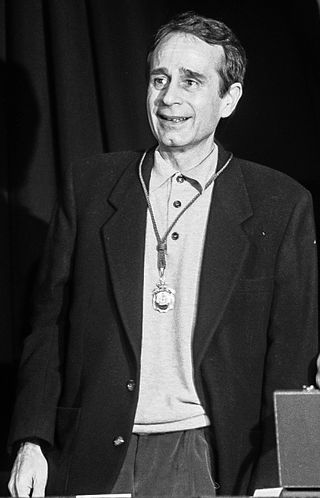
Ovidi Montllor was a Valencian singer-songwriter and actor.
Antoni de Literes, also known as Antonio de Literes or Antoni Literes Carrión) was a Spanish composer of zarzuelas. As with other national forms of baroque opera, Literes's stage works employ a wide variety of musical forms – arias, ariettas and recitative as well as dance movements and choruses, though here mingled with spoken verse dialogue. His use of the orchestra follows French and Italian practice in including guitars, lutes, and harpsichords amongst the continuo instruments.

Françoise Atlan is a French singer and ethnomusicologist, born in a Sephardic Jewish family in Narbonne, France on 27 July 1964. Her father was a lawyer and native of Béjaïa, Algeria, and her mother was a pianist and a lyrical singer.

Estampie is a German music group, founded in 1985 by Sigrid Hausen, Michael Popp and Ernst Schwindl. The band plays primarily medieval music, with some modern influences from world and minimalist music.
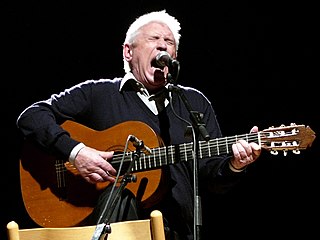
Ramon Pelegero Sanchis, who takes the stage name of Raimon, is a Spanish singer. He performs in the musical style of Nova Cançó, and in the Catalan language.
Capella de Ministrers is an early music group formed in 1987 in Valencia, Spain, by Carles Magraner. Valencian music is prominent in its repertoire.
Juan de Triana was a Spanish composer of the Renaissance period, active in the second half of the 15th century during the reign of the Catholic Monarchs. Pope Sixtus IV issued a bull on 9 February 1478 that listed De Triana as Prebendary of the Cathedral of Sevilla for at least a year before. He later moved to the Cathedral of Toledo, where it was recorded that in 1483 he was a teacher of six children in the Cathedral, with a salary of 18,000 maravedíes, a significant quantity at the time. Possibly Triana held this position until 1490, when he was replaced by Pedro de Lagarto. He died in Seville on 28 January 1494, and was buried near the gate of the chapel of the Virgen de la Antigua. In his will, he left a bequest to endow a chaplaincy to sing twenty-five masses a month for his soul at the altar of San Juan Bautista, near his place of burial.
Samuel Gordon Armistead was an American ethnographer, linguist, folklorist, historian, literary critic and professor of Spanish. He is considered one of the most notable Hispanist scholars of the second half of the 20th and early 21st century.

Sarah Aroeste is an American singer and composer. Her music is often referred to as "feminist Ladino rock." She also writes books for children with Sephardic themes.
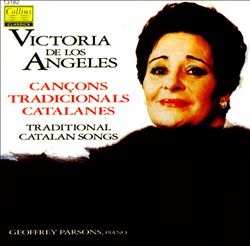
Cançons Tradicionals Catalanes is a 1991 album of Catalan music by Victoria de los Ángeles, accompanied by Geoffrey Parsons. Recorded at the Abbey Road Studios, London, it was originally released on Collins Classics in 1992, and later re-released with the original texts and translations by Brilliant Classics.
Manuel Palau Boix was a Spanish composer and teacher in Valencia Conservatory. He wrote a large number of symphonic, band, choral and chamber works. He was one of the most popular and important composers of his time. He received the Spanish National Music Award twice, first in 1927 and again in 1945. His music is known within the Spanish classical music for being a representative of what it has been called “Mediterranean” style, like other Spanish musicians such as Vicente Asencio or Oscar Esplá.
Judith Rita Cohen is a Canadian ethnomusicologist, music educator, and performer. Her research interests include Judeo-Spanish (Ladino) songs; medieval and traditional music from the Balkans, Portugal, French Canada, and Yiddish; pan-European balladry; and songs from Crypto-Jewish regions in Portugal. She has received numerous research and travel grants to do fieldwork in Spain, Portugal, Morocco, Israel, Turkey, Greece, France, Belgium, Canada, and the United States, and has published many journal articles, papers, and book chapters. She plays a variety of medieval musical instruments, and sings and performs as part of her lectures and in concerts and solo recitals. She is also the editor of the Alan Lomax Spanish collection maintained by the Association for Cultural Equity.
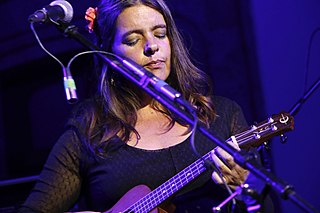
Dora Juárez Kiczkovsky is a Mexican singer and filmmaker of Argentinian Jewish origin.
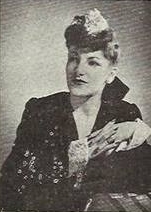
Sofía Noel, birth name Sophie Heyman, (1915–2011) was a Belgian-born Spanish soprano and ethnomusicologist who specialized in Sephardic music. After leaving Belgium to escape Nazi persecution, she settled in Barcelona where she worked with the composer Fernando Obradors. Shortly before his death in 1943, she sang to the accompaniment of the pianist Ricardo Viñes. In addition to singing and promoting Sephardic music, Noel also recorded Spanish songs from the Middle Ages, including those related to the country's Jewish and Arabic heritage.














